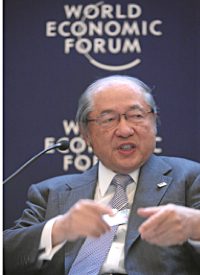
Global elites — many of the 2,500 of them billionaires — are spending a few days in Davos, Switzerland, attending the World Economic Forum (WEF), a group founded in 1971 “committed to improving the state of the world.”
The state of the world doesn’t appear too rosy. The recent downgrades of major economies, the clamor over perceived income inequality, the crisis in the eurozone, and other concerns are weighing heavily on the participants. Vikas Oberoi, chairman of India’s second-largest real estate developer, observed, “Many who will be in Davos are the people being blamed for economic inequalities. I hope it’s not just about glamour and people having a big party.” Azim Premji, chairman of India’s third-largest software company, was equally somber: “We have seen in 2011 what ignoring this aspect can result in. If we don’t take cognizance of it and try to solve this problem, it can create a chaotic upheaval globally.”
Not just the movers and shakers were expressing concern, either. Mainstream economists were of one mind about the world economy, agreeing with the downbeat report from the International Monetary Fund on January 24 which reduced its economic growth outlook for 2012 significantly, predicting at least a “mild recession” in Europe and the rest of the world to slow further from its current tepid pace.
Carmen Reinhart of the Peterson Institute for International Economics agreed that there will be a “serious economic crunch [with] another sub-par year of stubbornly high unemployment, weak growth and delayed recovery in general in all the advanced economies.” Professor Joseph Stiglitz of Columbia University, also on the roster of attendees, said that the IMF might be underestimating the projected difficulties and that the crisis will be “all the worse because of the weakness of appropriate government response.”
Manpower CEO Jeff Joerres admitted, “Twelve months ago we were all looking forward to a pretty good 2011. Twelve months later, here we are in a completely different world.” That was the tone set by the founder of the WEF, Klaus Schwab, in his opening remarks. The problem is that capitalism, according to Schwab, is failing and that new models must be developed and implemented to keep the economic crisis from worsening:
We have a general morality gap, we are over-leveraged, we have neglected to invest in the future, we have undermined social coherence, and we are in danger of completely losing the confidence of future generations.
Solving problems in the context of outdated and crumbling models will only dig us deeper into the hole.
We are in an era of profound change that urgently requires new ways of thinking instead of more business-as-usual. Capitalism in its current form has no place in the world around us.
Billionaire Victor Pinchuk, founder of Interpipe, a Ukrainian steel pipe manufacturer, agreed: “The global social-economic order will change, [whether] we want it or not. [Businesses must assure a] more just distribution of wealth.” Rahul Bajaj, a billionaire from Mumbai, said, “The rich have done much better than the poor, and that creates problems.”
Bajaj has just the answer: more of what caused the economic slowdown in the first place. He wants more government spending in the form of public-private partnerships that “could then invest…in infrastructure, education, food and water to benefit those below the poverty line.”
Moises Naim of the Carnegie Endowment for International Peace has his list of statist solutions for the problems caused by government interventions:
• More austerity for those economies that overspent and over borrowed
• Tighter fiscal control from a central supra-national body
• More loans by the European Central Bank (ECB)
• Restructuring of the Greek debt to allow them to keep spending without defaulting
• Recapitalization of the weak European banks who made the bad loans to Greece in the first place
None of this is likely to take place, at least in Davos. The WEF started in 1971 as an attempt to help business owners incorporate state-of-the-art management strategies from the west and has grown over the years to equal, in size at least, the Bilderberg Group, only without the privacy. That is not to say that it is without influence. People who are invited to attend are often referred to as “Davos Men,” defined as internationalists without a home. Samuel Huntington, the political scientist who came up with the term, calls them people who “have little need for national loyalty, view national boundaries as obstacles that thankfully are vanishing, and see national governments as residues from the past whose only useful function is to facilitate the elite’s global operations.” Chilling as that opprobrium may be, the Davos meeting is, in Gary North’s opinion, nothing but noise and celebration of their success in manipulating governments to their own benefit. Wrote North in his members-only newsletter:
The arrogance of these clowns is profound: “Gee, guys, let’s all try to attend the lecture and panel discussion that will offer a New World Order for our New World Order. Then we’ll tell each other what we heard.”
I have news for them. Every attendee will go home knowing that he wasted his time at the presentations he attended.
The real heavy lifting to build the New World Order takes place at meetings of the Bilderberg Group and the Council on Foreign Relations. Davos is just a sideshow, a distraction, “full of sound and fury, signifying nothing.”
Photo: Yorihiko Kojima, Chairman of the Board, Mitsubishi Corporation, Japan



